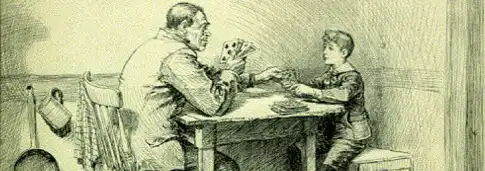
TEENAGERS AND CARD GAMES
For many years, classic card games such as poker, blackjack, and bridge have been popular pastimes among people of all ages. However, in recent years, there has been a noticeable decline in the popularity of these games among teenagers. This trend is worrying for many reasons, as these classic games offer a wealth of benefits to young people, including socialization, strategic thinking, and improved communication skills. Below, I will explore some of the reasons for this decline and consider what can be done to reverse it.
One possible explanation for the decline in popularity of classic card games among teenagers is the rise of digital entertainment. Young people today have access to an almost limitless range of digital entertainment options, from social media and video games to streaming services and online gambling sites. These forms of entertainment are often more convenient and accessible than traditional card games, which require physical cards and a group of people to play with. Moreover, digital entertainment is often more visually appealing and engaging than card games, which can seem old-fashioned and dull by comparison.
Another factor that may be contributing to the decline in popularity of classic card games among teenagers is the changing nature of social interactions. In the past, card games were often played in person, with friends and family members gathered around a table. However, today's teenagers are more likely to communicate and socialize online, using social media and messaging apps to connect with friends and peers. This shift in social behavior may be making it harder for young people to find opportunities to play card games and to develop the social skills that these games can help to foster.
A third factor that may be contributing to the decline in popularity of classic card games among teenagers is the changing nature of education. Many schools today place a greater emphasis on academic achievement and standardized testing than on extracurricular activities and socialization. As a result, young people may have less time and energy to devote to leisure activities such as card games, and may be less likely to seek out opportunities to play and learn these games.
So what can be done to reverse the decline in popularity of classic card games among teenagers? One possible solution is to make these games more accessible and appealing to young people. For example, card game manufacturers could create digital versions of classic games that are more visually appealing and engaging than traditional card games. These digital versions could be made available on mobile devices and social media platforms, making it easier for young people to play and share these games with their friends.
Another solution is to promote the social and educational benefits of classic card games to young people and their parents. Card game manufacturers could partner with schools and community organizations to offer workshops and events that promote the benefits of playing these games. Parents could also be encouraged to introduce their children to card games as a way to develop social and strategic thinking skills outside of the classroom.
In addition, efforts could be made to create more opportunities for young people to play classic card games in person. Community centers, libraries, and other public spaces could be encouraged to host regular card game events for teenagers, providing a safe and welcoming environment for young people to socialize and learn these games. Schools could also be encouraged to incorporate card games into their extracurricular programs, offering students the opportunity to learn and play these games with their peers.
Ultimately, the declining popularity of classic card games among teenagers is a complex issue with no easy solutions. However, by promoting the benefits of these games and creating more opportunities for young people to play and learn them, we can help to reverse this trend and ensure that future generations continue to enjoy the social and educational benefits of these timeless pastimes.